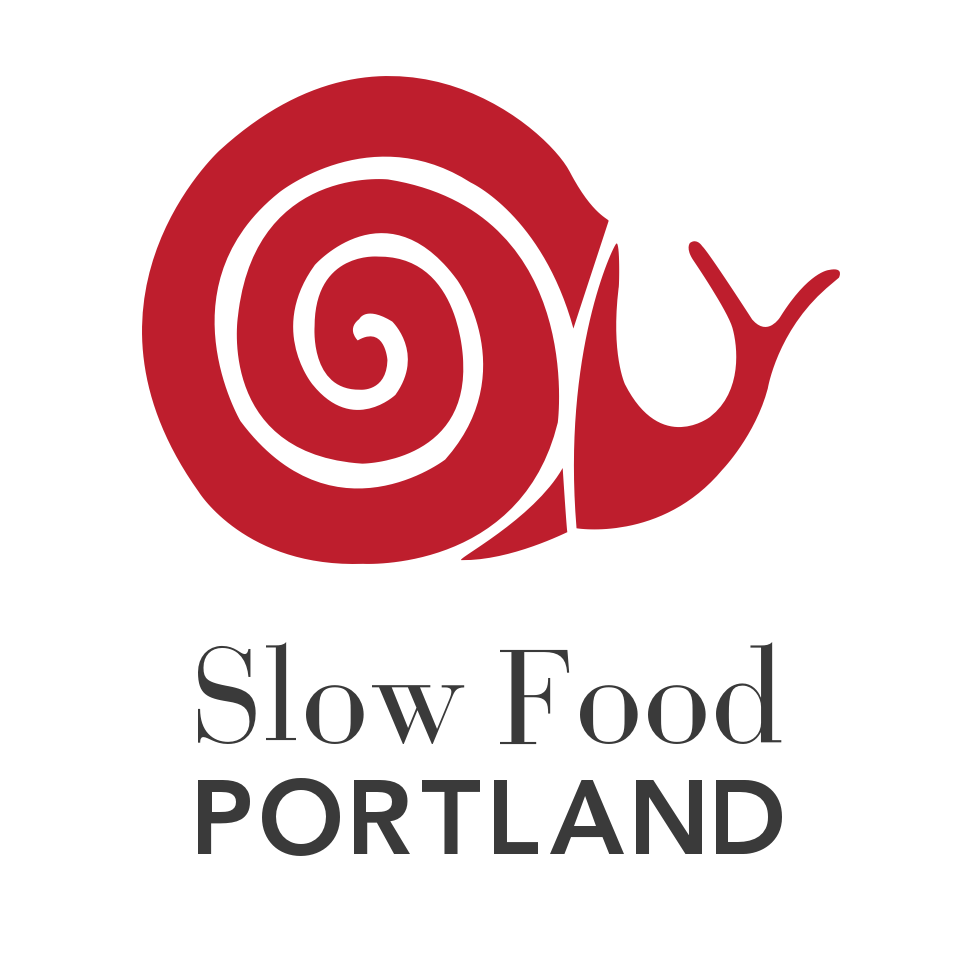Winter Seasonal Eating in Portland, Oregon
By Stephanie Celin, Marketing & Communications, Slow Food Portland
Seasonal eating can be relatively accessible if you live in the Portland area. Tart rhubarb, juicy strawberries, and delicate greens in the Spring. Summer brings sweet tri-color corn, tangy blueberries, and spicy chili peppers. Fall extends much of the summer's offerings, plus crisp apples and honey-like persimmons.
Then there is Winter.
One might think it's all turnips and potatoes, but there is so much more! If you are willing to try new things, eating seasonally can be done deliciously in the coldest of the seasons.
What does "eating seasonally" mean?
Seasonal eating means consuming fresh local produce when it is naturally ready for harvest. According to the 2008 Food, Conservation, and Energy Act, the total distance that a product can be transported and still be considered a "locally or regionally produced agricultural food product" is less than 400 miles from its origin or within the State in which it is produced.
Benefits of Eating Produce in Season
Seasonal Produce is More Nutritious and Better Tasting
Fruits and vegetables are more nutritionally dense and flavorful when grown and allowed to ripen naturally on parent plants during their appropriate seasons. Factors like the soil quality, amount of sunlight, and climate contribute to the quality of nutrient composition of foods too.
Out-of-season produce sold in supermarkets has been typically grown in hothouses, harvested early, stored, and transported across great distances. It could be weeks or months since it has been picked when it gets to you with diminished nutrients and taste.
Good for the Local Economy
Buying local food supports the local economy. The money you spend on products from local farmers stays in the community and is reinvested in other local businesses. In addition, food grown, processed, and distributed locally to local restaurants and independent grocery stores generates jobs and subsequently helps stimulate local economies.
Environmentally Responsible
How far did that tomato you bought in January at the supermarket have to travel? Was it exported from another state? Another country? On average our food travels 1,500 miles from farm to plate. Our best-loved foods take a toll on the environment—food production and transport releases fossil fuels and greenhouse gases like carbon dioxide, contributing to air pollution and global warming. Eating seasonally and locally helps cut down on the travel time of food from the farm to your plate, thereby decreasing environmental impact.
Improves Affordability
Eating seasonally and locally can be easier on your wallet. Buying strawberries in February at the grocery store can be more expensive than a farmers market booth in June. When fruits and vegetables are in season, more supply is available, resulting in lower prices.
Produce Available in the Winter
Expect to see the following hardy produce in Portland from December thru March:
Apples
Broccoli
Brussels sprouts
Cabbage
Cauliflower
Carrots
Celeriac
Garlic
Kale
Leeks
Mushrooms
Parsnips
Pears
Onions
Potatoes & Sweet Potatoes
Radishes
Radicchio
Rapini
Rutabaga
Sunchokes
Swiss chard
Turnips
Winter Squash
Sourcing Winter Produce
Finding seasonal fruits and vegetables at the grocery store is possible, however to find out where it was grown and by whom can be challenging. Consider buying produce from these options – where you can meet and chat with the folx who grew the food!
Farmers Markets
See what's available now by visiting the farmers markets open during the Winter 2022 season in the Portland metro area:
Portland Farmers Market at Portland State University - Every Saturday, 9 am – 2 pm.
People’s Food Co-Op - Every Wednesday, 2 pm - 6 pm.
Hollywood Farmers Market - Saturdays, January 22, February 5 & 19, and March 5 & 19 - 9 am – 1 pm.
Hillsdale Farmers Market Sundays, January 23, February 6 & 20, March 6 & 20 - 9 am – 1 pm.
Montavilla Farmers Market - Sundays, January 23, February 13 & 27, March 13 & 27 - 10 am – 2 pm.
Oregon City Farmers Market - Saturdays, January 22, February 5 & 19, March 5 & 19 - 10 am – 2 pm.
South Waterfront Farmers Market - Thursday, January 13, and Thursday, February 10 - 10 am – 2 pm.
Subscribe to a CSA
A Community Supported Agriculture program allows consumers to buy local, seasonally fresh food directly from a farm. A farm opens a number of "shares" to the public, typically well before the growing season, so that they may use the money towards operational costs. In return, members receive a box of seasonal produce each week or month throughout that particular farming season. Subscribing to a CSA program is a great way to learn about fruits and vegetables that you may not have chosen to buy at the grocery store.
Interested in finding a farm offering a CSA near you? Check out Pacific Northwest CSA's New Farm Search Tool.
Resources for Winter Produce Recipes
Need some inspiration or ideas on what to do with your fresh, locally sourced winter veggies? Ask the farmer you are buying from - they often have great recommendations on how to best prepare the produce.
Check out these local organizations' websites that are chock full of tips and recipes.
Eat Winter Vegetables Project by OSU Vegetable Cropping Systems Program, OSU Small Farms Program, and the Culinary Breeding Network.
The following cookbooks are by local authors and chefs that feature recipes using seasonal ingredients specific to the Portland area. They are available at local independent bookstores, Powell’s Books online, and county libraries.
Portland Farmers Market Cookbook: 100 Seasonal Recipes & Stories That Celebrate Local Food & People by Ellen Jackson
Six Seasons: A New Way With Vegetables by Joshua McFadden and Martha Holmberg
Taste & Technique: Recipes to Elevate Your Home Cooking by Naomi Pomeroy
Local Dirt: Seasonal Recipes for Eating Close to Home by Andrea Bemis
